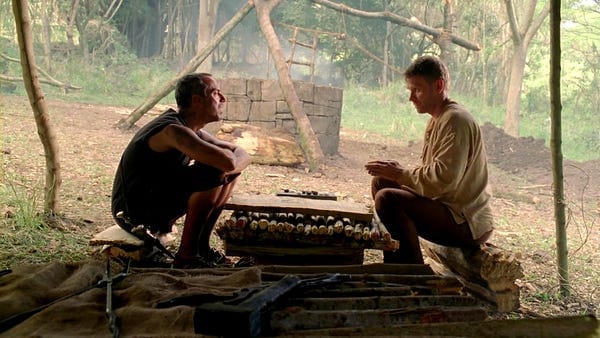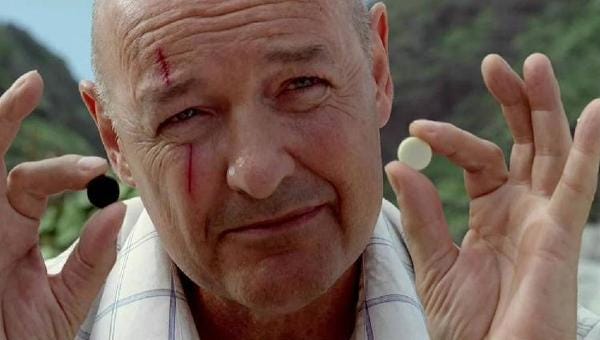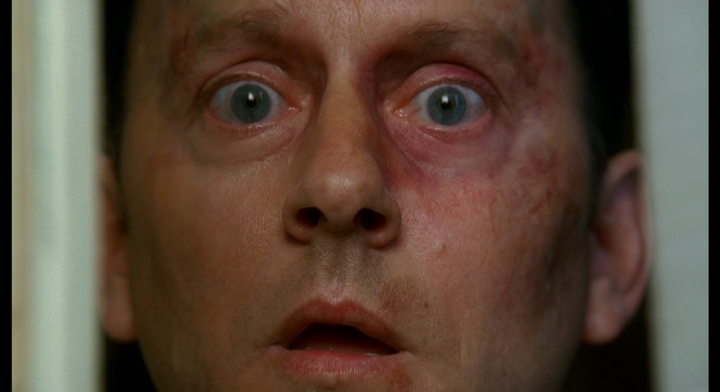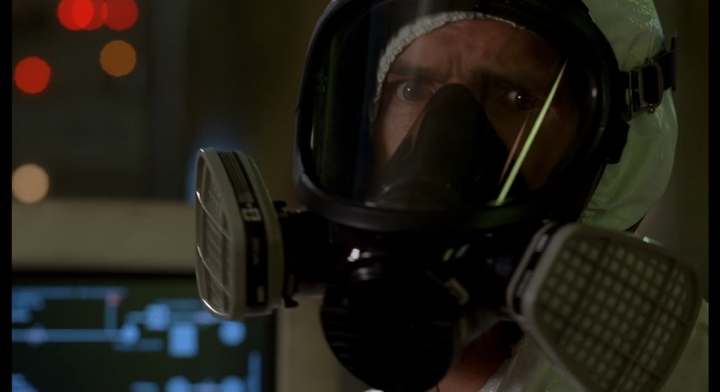LOST 001: Observation vs. Belief
We’ve got to go back, Kate! We’ve got to go back! Unpacking the TV show LOST —Part 1

Note: this essay was originally published on Revue on November 29, 2021.
I threatened you, and you didn’t listen; now it’s too late for you. I’m going to do a series on the TV show LOST, which is one of my favorite fictional narratives ever—with occasional installments that I drop into the mix whenever I see fit. How occasional? As occasional as I desire. I am the Island God of this newsletter, and I make the rules.
Some opening business:
1) While I expect to eventually arrive at a review through the story in rough episode order, I don’t expect it to be an episode-by-episode re-watch. It will be a bunch of entries, with some spanning a length of relatively uninteresting episodes, and some lingering on a particularly important aspect of a single scene. It’ll be done when it’s done, and I have no idea when that will be. It will only end once; anything that happens before that is just progress.
2) Please be aware I’m going to spoil the hell out of this entire show and I’m not ever going to pause to warn about it. So if you’d been hoping to get around to watching LOST during the last 12 years or so since it wrapped up, now would be the time to do that, or else it would be a good time to put any LOST-related articles in lead-lined containers and sink them in the ocean.
3) The purpose of this series is to unpack a beautifully complex and messy show that’s been both obsessively reviewed and frequently misunderstood—usually at the same time, and to explain what I believe to be happening in the story, to the best of my ability.
My hope is to provide a framework that can furnish somebody re-watching (or even watching for the first time) with a deeper understanding of what’s happening.
The main reason I want to do this is as an investigation of story—particularly an investigation the way I look at story. LOST is story that lends itself very well to investigation of how story does and doesn’t work. If you’re interested in how I experienced LOST, or if you’re interested in how I think about story and break it down, or if you just want another way to watch episodes of a show you love, or you’d like to watch a complex show for the first time with Cliff’s Notes ON … this is for you.
Oh and one other thing …
4) I’m quite aware that you probably think the narrative fell apart some time before the end, or you watched a bit of it but then just couldn’t continue because of [reason], and you believe the creators were making everything up as they go along. If this is you, you might feel the urge to comment to say this, and while nobody can stop you, I’d like to ask you to resist that urge. I want to assure you that if you feel this way, you’ve already won the day. Everybody thinks this already. It’s the thing everybody thinks about this show. You are in the clear majority.
If you do give into this urge, nothing bad will happen to you, but rest assured you will bore me.
What I’m going to do instead is something I think you’ll find more fun: pretend we live in an alternate dimension where the story, warts and all, actually makes quite a bit of cohesive sense. That’s where you’ll find me.
Some middle business:
I want to begin by identifying what I see as the overarching theme, which also serves as a sort of instructional brief on how to watch the show.
Let me name what I see as the central dialectic, a fancy lit theory term I’m probably misusing, which I understand to mean “the central ideas within an artistic work, which act in opposition to one another, in order to generate that work’s most formative ideas.”
I would name the dialectic of LOST as: Observation vs. belief.
This dialectic isn’t too tough to detect. There’s even an episode called “Man of Science, Man of Faith.”
The thing about the idea of dialectic that I like is, while these ideas are oppositional within the artistic work, they aren’t opposites. In a dialectic, the opposing ideas also operate in concert with one another. It’s a versus, but it’s not an either/or. There isn’t going to be a final winner. In a dialectic, the struggle is the point. It’s generative. The struggle is where the art happens.

Back to LOST.
The surface narrative of the show’s six seasons can be stated clearly: A group of seemingly unrelated people come by seeming accident to an island, where they begin to suspect that they are parts of a much larger story, a story in which they’ve been entangled without knowing it their entire lives. They fight and struggle and often die to learn what that larger story is, and what their part in it is. By the end, they have learned as much as they will ever know about that larger story, and have either fulfilled their part of that story, or they haven’t.
Also, Jack is kind of a dick.
All the characters arrive at the island with questions to one degree or another. Some have questions that are very practical (“guys … where are we?”), while others have deeper questions about what their place is in the universe … what their meaning is, or if they even have a meaning. Everyone is eventually given answers of some kind or another, which are frequently contradicted by other answers. Some believe entirely in what they’re told, captured by a story they desperately want to believe is true. Some remain bitter skeptics, convinced by their observation of contradictions and unknowable mystery that they’re being toyed with by forces outside their control.
Those who approach the mystery of the larger story with blind faith find themselves disillusioned, rejecting the truth they see unfold before their eyes because it fails to hold true to what they’ve been told.
Those who insist on focusing only on what is observed finally find themselves at the limits of their understanding, forced to decide whether the larger story they’re experiencing is ultimately unknowable, or is just a mistake crafted by a disinterested and distant god.
All these characters act and interact within the context of the mystery: the buried underlying story.
So do we.
Because here’s the thing: What that larger story actually is remains a mystery to all these characters. We viewers, if we are careful observers, can see almost all of it … enough to see that even the very most powerful characters, who initially seem to know all the answers, are actually missing important pieces of the story, whether they realize it (which they sometimes do) or (as is more often the case) not.
But even the very most knowledgeable entities in the entire narrative—that would be us, the viewers—are never given the whole thing. And many of us, too, make assumptions based on what we’re told, which, because of the conventions of an ongoing television drama, we assume to be correct, even when something happens right in front of our eyes that contradicts that belief.
In other words, when something happens that makes it impossible for what we’ve been told to be true, rather than look at what we have just seen, and recontextualizing what we have been told in light of the new information, we frequently immediately assume some terrible mistake or oversight has been made by our “gods"—the show creators—and many of us become disgusted or disillusioned.
And then there are those of us viewers who make careful observation (one might even say obsessive observation) of every detail, and put together complex theories, only to be confounded and disappointed, even angered, when no voice ever appears on screen to state, unequivocally, that those theories were correct, or to ever show every last piece of the puzzle finished, forcing within us a choice: whether to abandon the whole thing as a botched job, or to take a leap of faith beyond the limitations of our observations.
(I suspect that even the very most powerful entities in the entire narrative—that would be the creators of the show—don’t give themselves all of it. They leave some of it buried even to themselves. They release themselves, as Leonard Cohen puts it, to the laws of gravity and chance. But that’s just my belief.)
So this is a narrative running on an understory that lies mostly buried for almost the entirety of the narrative, and which is never entirely divulged.
The characters (and we) spend all our time wondering what that narrative is. And, at the end, to a certain degree, they (and we) are still wondering.
Moreover, this is a puzzle box show, a structure that leads its audience to expect answers, even demand them. Which is understandable! After all, the purpose of a puzzle is to solve it, right? But this puzzle is, ultimately, about the fact that it is the nature of the human condition to want answers to questions that will never be answered.
It’s a show that creates a desire for a resolution, but whose themes demand that no resolution be given, other than what can at last be guessed at—other than what we choose to believe, hopefully after careful observation.¹
It’s a puzzle about the nature of reality, whose solution is "the puzzle can’t ever be entirely solved” … which does seem to be the nature of reality.
That is, in my opinion, delightfully perverse. It would make me chuckle admiringly, if anybody actually chuckled admiringly in real life.
It’s SO unusual. A show that is almost structurally intended to be misunderstood, almost designed to disappoint. And it requires its audience pay a level of attention to it that I’d have to characterize as ‘unfair.’
AND they make the sort of mistakes you’d expect to see, in an ongoing show spanning over a hundred hours of screen time.
Yet for all that, it holds together to a surprising degree, once you excavate some core truths from the buried understory, using observation.
It’s not a show I necessarily blame people for disliking, or getting angry at or become disillusioned or disappointed in, in almost the exact same way that many of the characters who are the truest believers in the island and the answers it promises eventually become.
If you say you hate it, I won’t argue.
But I love it, and I hope to tell you why.
Here we go.
L O S T
NEXT TIME: Excavating some core truths from the buried understory.
_____
¹ It’s the sort of show that, if it were being made by a purposeful author, might for example include an early sub-mystery that is literally buried in the ground, some sort of, oh-let’s-call-it-a-“hatch,” which needs to be excavated … but which, once opened, leads not to answers, but even deeper questions. Something like that, if that were in this story, might be an early indicator that the show creators were purposefully doing the sort of thing I suggest.
_____
A.R. Moxon is the author of The Revisionaries, which is available in most of the usual places, and some of the unusual places. He’s a complex guy, sweetheart.




Comments ()